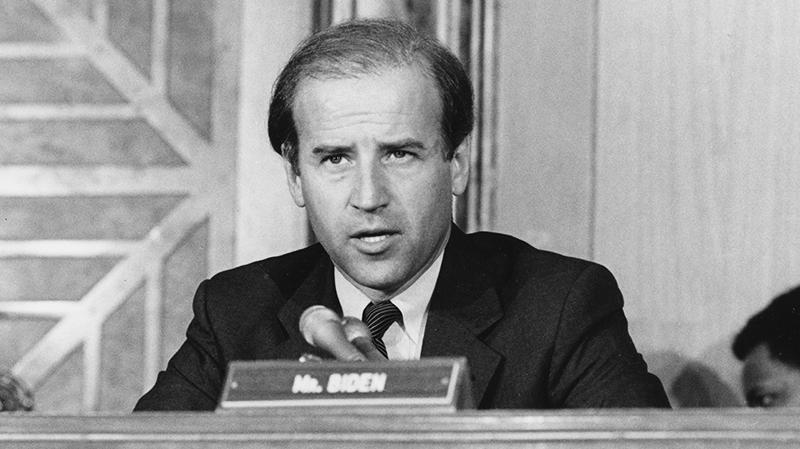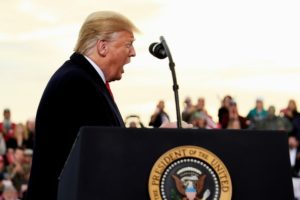
The first presidential debate between President Donald Trump and former Vice President Joe Biden will go down in the history books as a loud and raucous spectacle. But a telling moment of silence from Biden caught the attention of media outlets on both sides of the political divide.
Early on in the debate, moderator Chris Wallace asked Biden whether he supports ending the filibuster and “packing” the Supreme Court; Biden chose not to answer the question, arguing that “whatever position I take on that, that’ll become the issue.” When Biden’s running mate, Senator Kamala Harris, was asked about the same proposals on CNN after the debate, she echoed Biden’s maneuver, shifting the focus to the impending election.
Biden’s campaign appears to believe that focusing on issues such as expanding the Supreme Court and abolishing the filibuster—the Senate procedural tactic where a forty-one vote minority can stall legislation indefinitely—would be divisive and distracting in a general election where Biden has sought to reach out to politically disengaged voters with a message around “kitchen table issues” of COVID-19 and its economic fallout.
Biden may be justified in deciding that most voters are not interested in the inside baseball of Senate reform. A FiveThirtyEight pre-debate poll conducted last week found that the pandemic and the economy were far and away the two most important issues for voters. As University of Maryland political science professor Francis Lee explained to Vox in February, “Realism about these constraints [on majority governance] is just not a compelling electoral message.”
On the other hand, the recent passing of Supreme Court justice Ruth Bader Ginsburg—and Republican Senate leader Mitch McConnell’s hypocritical insistence on replacing her a month before the election despite creating a precedent to the contrary in 2016—galvanized the Democratic base to the tune of a record-breaking fundraising boon.
Additionally, the political consequences of Ginsburg’s passing immediately sparked calls for reforming the Senate. For instance, Massachusetts Senator Ed Markey tweeted that if McConnell confirmed a justice before the election, “we must abolish the filibuster and expand the Supreme Court.”
While Markey’s suggestion of court-packing can be seen as a tit-for-tat retaliation for a potential confirmation of Amy Coney Barrett, the renewed push to end the filibuster is not directly tied to Barrett’s confirmation. Indeed, if Republicans didn’t end the filibuster for Supreme Court nominees during the 2017 nomination process of Justice Neil Gorsuch, Democrats would currently be able to block the Barrett nomination.
Rather, McConnell’s haste to fill this vacancy has poured salt on lingering grievances from the Obama administration—especially McConnell’s refusal to consider Obama’s SCOTUS nominee Merrick Garland in 2016. Back then McConnell argued that, since it was an election year, “the American people should have a voice in the selection of their next Supreme Court Justice.”
Vox’s Ezra Klein laid out shortly after Ginsburg’s death how McConnell’s incessant and conniving obstructionism during the Obama administration disabused even moderate Democrats of the prospect that Mitch McConnell would let them govern if they won a majority. Klein frames McConnell as uniquely responsive to the increasingly zero-sum incentives of the Senate in an era of polarization. However, Senators across the spectrum are coming to accept this new reality—after all, it was then Democratic leader Harry Reid who struck the first blow to the filibuster in 2013 for most executive and judicial nominees.
The push for sweeping procedural reform is typically associated more with the left wing of the Democratic Party. But even before Ginsburg’s passing, these ideas had reached a broader audience. In a eulogy for the late civil-rights icon John Lewis, former President Obama declared that “if [passing voting rights legislation] takes eliminating the filibuster — another Jim Crow relic — in order to secure the God-given rights of every American, then that’s what we should do.”
In spite of growing disillusionment in the public and in his own party, Joe Biden has steadfastly maintained that the Senate can return to its old ways. Biden defended the filibuster and opposed SCOTUS restructuring during the primary season. But more than that, his campaign embodies the ideals of compromise and community that Senate norms like the filibuster supposedly protect. Biden has repeatedly touted his record as a dealmaker and his ability to build relationships across the aisle. So in his first appearance after Ginsburg’s passing, Biden did not call for court-packing, or even more benign forms of procedural warfare. Instead, Biden asked Republicans to “please, follow your conscience.”
Biden’s conscience as a lawmaker and reverence for Senate tradition may be a product of his start in the Senate during the 1970s. Biden contends though that one need not harken that far back to witness a more functional Senate and federal government.
So given his background as a Senate institutionalist, and given his experience as the chair of the judiciary committee, Biden remaining open to filibuster reform and deeming court-packing “a legitimate question” represents a notable departure from his deep-seated respect for Senate tradition.
Biden’s gradual drift on procedural reform is similar to how he has adjusted his positions in continual alignment with his party over the years on issues from incarceration to the Iraq war. This trend highlights another of his aspirations—to be a true party leader. As Biden declared in Tuesday’s debate, “I am the Democratic Party right now. The Democratic Party is me.”
More than any policy priority, Biden made party unity a central focus throughout his primary campaign. And afterwards, his campaign followed through, forming a “unity taskforce” with leaders in the Sanders campaign and the Democratic Party which authored a comprehensive set of policy recommendations.
The taskforce agenda prompted Sanders to call Biden potentially “the most progressive president since FDR.” But if Biden has any desire to actually pass that agenda, or even Obama’s more moderate agenda from a decade ago, the longtime Senator will have to face the structural gridlock in the Senate.
Biden conceded in July that whether the filibuster remains in a Biden presidency, will depend on how “obstreperous” Republicans are. But in that same appearance with reporters, Biden reiterated his faith in the possibility of bringing back bipartisanship.
“I think I have a pretty good record of being able to pull together Democrats and Republicans” Biden reaffirmed, “I’ve been fairly good at understanding the [political constraints] of a Senator and try to figure out how you can help them” be able to do the right thing.
Biden entered the Senate in 1972, and he would like to be the revivalist of that bygone era where Senate norms reigned supreme over power. But, as Biden put forcefully in the first presidential debate, he is also the standard-bearer for the Democratic Party. If he wins November’s presidential election, Biden may have to decide which title he wants most.
There’s also a chance he won’t have to, that his reputation as a Senate institutionalist and his purported penchant for navigating a colleague’s political constraints can let him transform the chamber without threatening it’s legitimacy.
The range of possible proposals that politicians are willing to support is commonly referred to as the Overton window. The Overton window can be based on direct assessment of public opinion, but it is often constructed by media organizations (in part through articles like this one!). Journalists and columnists determine which positions are well-established—climate change is real for instance, which positions are contested—should we have more corporate taxes, and which positions are in the political fringes—white supremacists should not stand by.
The Overton window is always a fluid dance between politicians, the public and the press. Those on the outside are always trying to tug (or “shift”) the Overton window towards their own views, and, given a major animating event, the window can shift rather quickly.
A dinner party the week after Obama’s inauguration saw GOP leaders coalesce around unvarnished obstructionism. RBG’s death may be the tipping point for “kitchen-table Democrats” to embrace the modern tools of procedural warfare.



